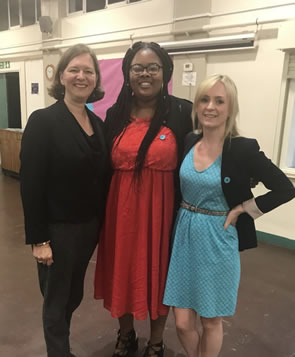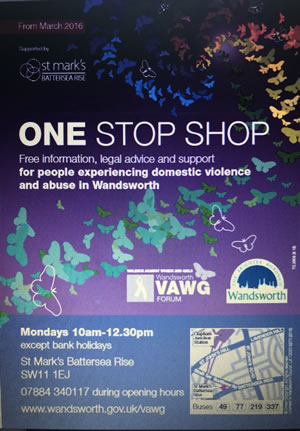Wandsworth Labour Women’s Forum Host Domestic Abuse Meeting
Local women sharing experiences and support on the issue of domestic abuse in the Borough

The domestic abuse event panel
Fleur Anderson, Putney’s Parliamentary Candidate, was one of the speakers at a meeting last week of local women sharing experiences and support on the issue of domestic abuse in the Borough and across our communities.
The meeting was hosted by the Wandsworth Labour Women’s Forum and was chaired by Claire Gilbert, Labour Councillor for Roehampton & Putney Heath. Speakers included the Wandsworth Area Manager of the brilliant charity Hestia, which supported over 10,000 people last year in London, including via its domestic abuse safe houses in Wandsworth.
Putney resident Maisha Sumah spoke movingly from the perspective of being a survivor of domestic abuse, something which started in her case during her teens. In common with many women who suffer domestic abuse, Maisha had seen her own mother abused by her father. Maisha has generously shared her experiences several times at both the House of Commons and the House of Lords, as well as on national television news, and she has become the youngest NHS mental health expert representative for BME communities in the UK at the age of 22.

Cllr Fleur Anderson,
Maisha Sumah and Cllr Claire Gilbert
Councillor Leonie Cooper, Assembly Member for Wandsworth & Merton spoke about the initiatives coming from the London Mayor’s office on this issue, including support for a Domestic Abuser’s register, recognising that there were over 150,000 reported incidents of domestic abuse in London alone last year.
The speaker panel also included an experienced IDVA (Independent Domestic Violence Advocate) who works with survivors in Wandsworth, including helping them with issues around housing.
Many know someone who has experienced domestic abuse. So what are the facts in 2019? Well, statistics from studies in this area are stark. Statistics show that 1 in 4 women (and 1 in 6 men) will suffer domestic abuse in their lifetimes, with two women dying per week in the UK. Domestic abuse has more repeat victims than any other crime, with 72% of victims having been victimised 3 or more times. Women are more likely to be the victim of multiple incidents, and 44% of female homicide victims are killed by their current partner or ex-partner. Over three quarters of murders of women by their partners occur at the point of separation or within a few months of separation. This is a crime which victimises and traumatises the next generation - 12% of children under the age of 11 have been exposed to domestic abuse between adults in their home.
Last week was #UKSaysNoMore week, during which Hestia publicised their report on the effects on children, and the cost to the economy of children’s exposure to domestic abuse – over £1.4 billion per year. The impact on children’s education and psychological health (moving home, difficulties concentrating, and in some cases, exclusions) is starting to be understood better, and there are many who believe that knife crime and other serious crimes have links to experiences of violence and abuse in childhood.
130 Parliamentarians have supported the #UKSaysNoMore project, including Jess Phillips MP who in 2016 began reading out the names of women who have lost their lives in that year to domestic abuse each International Women’s Day in Parliament to raise awareness. Jess worked at Women’s Aid for 5 years before entering Parliament. However, little progress has been made on this issue over recent years in terms of the number of women dying.
Help is most certainly available for survivors in this area of London. Wandsworth runs some excellent support services, including the One Stop Shop which takes place each Monday 10am -12:30 at St Mark’s Church SW11, providing a welcoming environment, cup of tea, and expert advice including a pro bono family solicitor and IDVA.

Women’s Space (women only) is 6pm-8:30 on Wednesdays at 229 Garratt Lane, Wandsworth SW18, offering information and support to women who have been affected by violence or abuse, including rape, sexual assault or prostitution. Victim Support operates a service at 10 Falcon Grove, and the Council operates a Groupwork and Parenting Service. And Hestia have a number of services including safe houses.
Councillor Gilbert has been a strong advocate of joined up information sharing in the area of domestic abuse and housing since being elected last year, having seen a number of cases where survivors were let down. Cllr Gilbert said: “Domestic abuse devastates the lives of victims. The nature of this crime is that it happens where we should feel safest, and so many suffer in silence. We know that housing officers often are aware of problems at an early stage, but the right response is critical. It is very positive to see that calls for Wandsworth Council (and Richmond Council) to seek accreditation from the Domestic Abuse Housing Alliance have been taken on board, and hopefully DAHA will be able to help improve services so that survivors are identified earlier and offered appropriate support, with a consistent set of standards and best practice responses”. Dr Rosena Allin-Khan MP and Labour’s Housing Speaker Councillor Paul White have led a campaign for better housing for survivors in Nightingale Square, Balham.
Fleur Anderson said:“It could happen to me or anyone. I feel full solidarity with anyone who has been a victim of domestic abuse. Domestic violence accounts for 16% of all violent crime in the UK, but it is the violent crime least likely to be reported to the police. It is the single highest reason for becoming homeless and in Wandsworth domestic abuse is the main cause of child protection interventions”.
Housing providers, including local authorities and housing associations, are in a unique position to help identify this hidden crime, with many victims making numerous reports to housing officers long before they consider involving the police. Certain types of reports or damage can be an indicator of abuse, e.g. broken bathroom doors, changing locks, or even arrears which can be a sign of financial abuse.
This wider picture is being recognised more and more, in particular by the Chartered Institute of Housing’s most recent presidents, first Alison Inman and now Jim Strang. Jim was himself a victim of abuse in his childhood, and he believes that speaking about his experience publicly has allowed others to speak out too. He said: “I say to men who approach me, “Stand up and be counted. We are the solution, because we are [predominantly] the cause”. Mr Strang’s goal for his presidency of CIH is to get every social landlord in the UK to sign up to the CIH’s Make a Stand campaign.
June 3, 2019
Related links
|